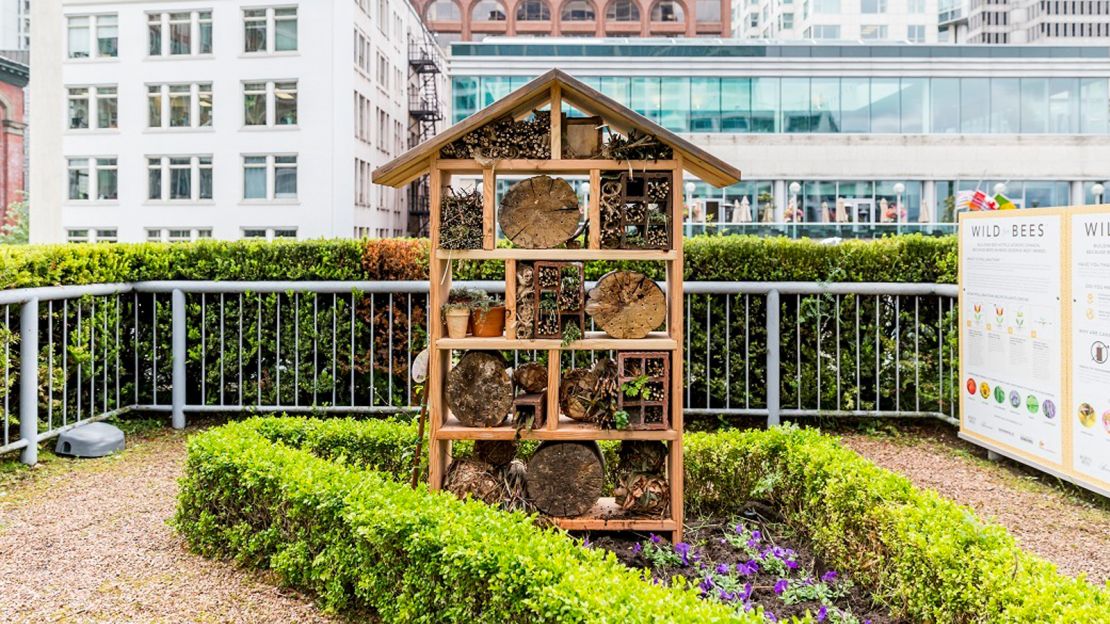What do London’s Buckingham Palace, New York’s Whitney Museum of American Art and the Notre-Dame Cathedral in Paris all have in common?
They’re all keepers of honeybees, part of a growing collection of bee-friendly landmarks around the world.
In recent years, global hotels have joined the urban bee-keeping trend too, bringing their own honey direct to their tables. That’s good news, considering the well documented decline in the bee population in certain geographical areas, notably North America and Europe.
A number of factors, including disease, pesticides and habitat degradation are attributed to diminishing bee numbers, and the losses are significant. These sweet creatures are the globe’s most prolific insect pollinators, whose combined annual economic value to agriculture worldwide is estimated at $167 billion.
Here’s a look at five top luxury hotels creating a buzz in their local communities:
1. Waldorf Astoria New York
On a rooftop 20 stories above Park Avenue in New York, some 360,000 bees produce more than 136 kilograms (300 pounds) of honey, harvested annually, which not only finds its way into the hotel’s menus, but also into treatments at the hotel’s Guerlain Spa.
“It is an important statement about our concern for the environment, it is educational for our culinary team, and it provides fresh fruits, vegetables, herbs and edible flowers throughout our hotel,” says David Garcelon, director of culinary at Waldorf Astoria New York.
With home-harvested honey, the hotel created Waldorf Buzz beer last year in partnership with the Empire brewing Company; a yet-unnamed new brew with lemon verbena and hops from the on-site garden is slated to be launched this fall.
Twice weekly, the hotel’s Historical Tour stops off at the garden to see the hives and its more than 60 types of herbs, fruit, vegetables and edible flowers.
On the menu: The “Wax Poetic” and “Leaves of Grass” cocktails at Peacock Alley lobby bar and restaurant are both made with Zubrowka bison grass vodka and house-made honey syrup.
2. Mandarin Oriental, Paris
Paris has been a pesticide-free zone for the past 10 years, making the capital of France an attractive urban environment for honey bees. With the help of local organization Apiterra, 50,000 bees reside at the MO rooftop beehive, with last year’s sweet haul totaling 25 kilograms.
Guests who can’t get enough of the ooey, gooey and very sweet syrup (in the words of Winnie the Pooh) offered through the hotel’s F&B menu can opt into the hotel’s eco-initiatives – such as reusing towels – to receive a jar of honey to keep.
On the menu: The “Homemade Honey” cocktail at Bar 8 is made with Yuzu liqueur, jasmine tea with ginger, Champagne and house-made honey.
3. W Taipei
Following a good eight months of prep work, W Taipei became the first urban beekeeping establishment in Taiwan when it opened up its 32nd floor rooftop to host some 150,000 busy bees in partnership with Syin Lu Social Welfare Foundation.
After six months and two harvests from the Sweet Reward program, the bee colonies were moved to another downtown building as part of the foundation’s larger urban beekeeping project.
Whatever honey the hotel chefs and mixologists don’t purchase from Syin Lu, the foundation (which produced more than 800 kilograms of honey in the first half of the year from 94 hives) either sells or produces soaps with it in their factory manned by disabled workers.
On the menu: The “Detox Martini” cocktail at WOOBAR is made with green tea-infused Belvedere vodka, Grand Marnier, orange juice, yuzu juice, house-made honey and Sprite.
4. Fairmont Waterfront, Vancouver

The pioneer of in-house honeybee production and supporting global bee health is Fairmont Hotels & Resorts, whose Bee Sustainable program comprises honeybee apiaries at more than 20 properties across the world.
“By building more than a dozen luxury bee hotels from coast to coast, we are doing our part to build a more sustainable world,” says Jane Mackie, Fairmont Brand vice president.
In June this year, the Fairmont Waterfront became one of the first hotels in the group to build a solitary pollinator bee hotel (aptly named Bee & Bee) designed to give busy bees a break between pollination missions.
The hotel also hosts 500,000 resident honeybees in the 195 square meter herb garden on the third floor terrace, which forage over 67 square kilometers and 60 different plants (particular favorites being the pollens from blackberry blossoms and American bamboo blossoms).
From May to September, guests can join a daily tour of the apiary and rooftop garden with a resident bee butler (and have a sneak peek at the bees from the observation hive). Guests can also request to go on a Pollinator Corridor Walk through the city with Hives for Humanity’s Julia Common.
On the menu: The “Waterfront Bee’s Knees” cocktail at ARC Bar is made with Bombay Sapphire Gin, lemon juice, house-made honey syrup and topped with Earl Grey tea foam.
5. St. Ermin’s Hotel, London
St. Ermin’s has been keeping bees for some four years now, first on the main rooftop and later expanding the installation to include a specially planted wildflower terrace where a new bee hotel – the first hotel in the UK to have one – now resides.
The hotel in London had their own honey analyzed, with results showing their bees gather nectar from over 50 different plants and trees within their three-mile forage radius (which includes Buckingham Palace Gardens and St. James’ Park).
September is the hotel’s annual honey month, when they celebrate their house-made amber nectar through all of the food and cocktail menus. During the same month, the hotel also hosts an urban beekeeping workshop with their expert beekeeper, Camilla Goddard of Capital Bee.
On the menu: The Bowler Hat cocktail at Caxton Bar is made with dry vermouth, London gin, raw house-made honey and lemon juice.
Born and bred in Taiwan, Tina Hsiao is a freelance writer based in Thailand.









